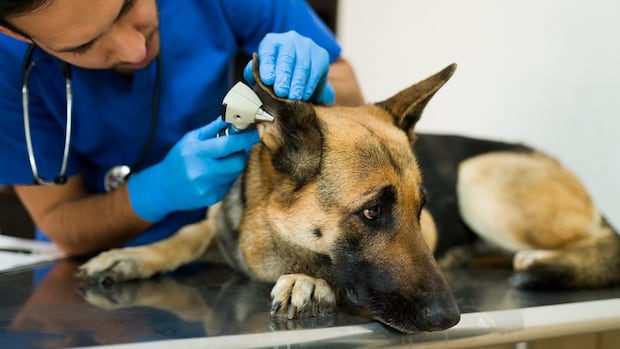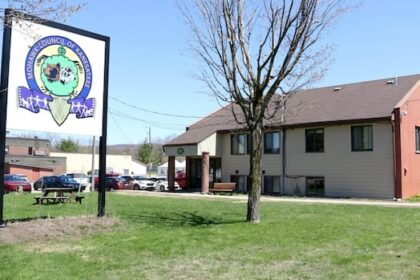British ColumbiaThe College of Veterinarians of B.C. says it’s facing possible insolvency next year unless members vote to increase fees by the end of the month.Concerns raised about college’s budget, risks of losing oversight bodyMichelle Morton · CBC News · Posted: Aug 22, 2025 9:00 AM EDT | Last Updated: 1 hour agoA stock photo shows a dog being examined by a veterinarian. B.C. has more than 2,000 practicing veterinarians, according to 2024 data from the College of Veterinarians of British Columbia. (antoniodiaz/Shutterstock)The College of Veterinarians of British Columbia is asking members across the province to vote on increasing their annual fees as it faces more than a $1 million deficit.The regulatory body, which oversees veterinarians, said it could face insolvency by May 2026 and to prevent that from happening it’s asking veterinarians to vote on increasing fees.Vets pay a range of annual fees to the college. For example, the current fee to run a private practice costs $1,395, and the college wants to see that climb to $1,900.This isn’t the first time the college has turned to vets to pay higher fees. Members, it said, have voted down fee increases three times since 2011 — in 2012, 2019, and 2023. Veterinarian Sarah Armstrong, who practices at Olympic Village Veterinary Clinic, said the college’s need hadn’t seemed dire in the past.”They’ve always presented a very rosy picture for their financials,” she said. “We didn’t see the need for the increase in fees.”WATCH | B.C. veterinarians vote on college fees: College of Veterinarians of B.C. facing possible insolvency in 2026The regulatory body of veterinarians in B.C. says it’s facing possible insolvency in 2026, unless its members vote to increase fees by the end of the month. But as the CBC’s Michelle Morton reports, concerns are now being raised about how vets’ registration money is being spent, and what oversight could look like if the College of Veterinarians of B.C. stops operating.The college’s financial statements show a cumulative deficit of nearly $1.2 million at the end of its 2023 and 2024 fiscal years, however, in the two years before that, it had a budget surplus of nearly half a million dollars. A note in the 2023-2024 annual report explains the deficit.”The losses result from an increase in costs to deliver the mandated regulatory requirements, despite no increase in the registration fees since 2011,” it reads. The college would not speak on the record with CBC News, citing a policy to deny media interviews, but in a statement posted to its website said it “has rigorously and prudently managed its finances in the face of significant operational challenges and inflationary pressures.”B.C. Agriculture Minister Lana Popham said she directed the college to hold a vote on increasing annual fees after learning about its financial struggles.Popham said that earlier this year, before ordering the referendum, she tried to help stabilize the college’s financial situation by issuing a ministerial order requiring veterinarians pay the organization a one-time $500 fee.”That was in hopes that they would move towards figuring out a longer term solution themselves,” Popham said.The Society of B.C. Veterinarians (SBCV), which represents the interests of vets, confirmed its members have paid that $500 fee to the college within the past few months.Popham said the college, which is an independent body, is critical.”We will see the outcome of this referendum and then we’ll figure out what the future is for the relationship between the College of Vets and vets in B.C.,” she said.Budget concerns, loss of oversightAnimal Law Lawyer Rebeka Breder is concerned the province does not have a backup plan in case veterinarians vote down the fee increase and the college becomes insolvent.”Just like any other profession that exists out there, it is crucially important that there is a regulatory body that oversees the standard and general practices.””It will be devastating, without overstating that, for companion animals and their owners if there is nothing in place as a backup by the government or any other credible organization,” Breder said.Armstrong, who is also a board member with the SBCV, said the society is encouraging veterinarians to vote yes to increasing fees because they want the college to succeed.”It’s a bit of a Band-Aid solution,” Armstrong said.”It will get them through to the 2026 year, and then we would like to see them come up with a reasonable budget to be able to move forward without having to ask for fee increases every year.”The voting period for the fee increase runs until Aug. 29. The college advised Popham in a letter that it expects to share the results with her on Sept. 2. ABOUT THE AUTHORMichelle Morton is a multi-platform journalist with CBC Vancouver and you can contact her by emailing michelle.morton@cbc.ca.
B.C. veterinarian oversight body faces possible insolvency, asks vets to pay more











